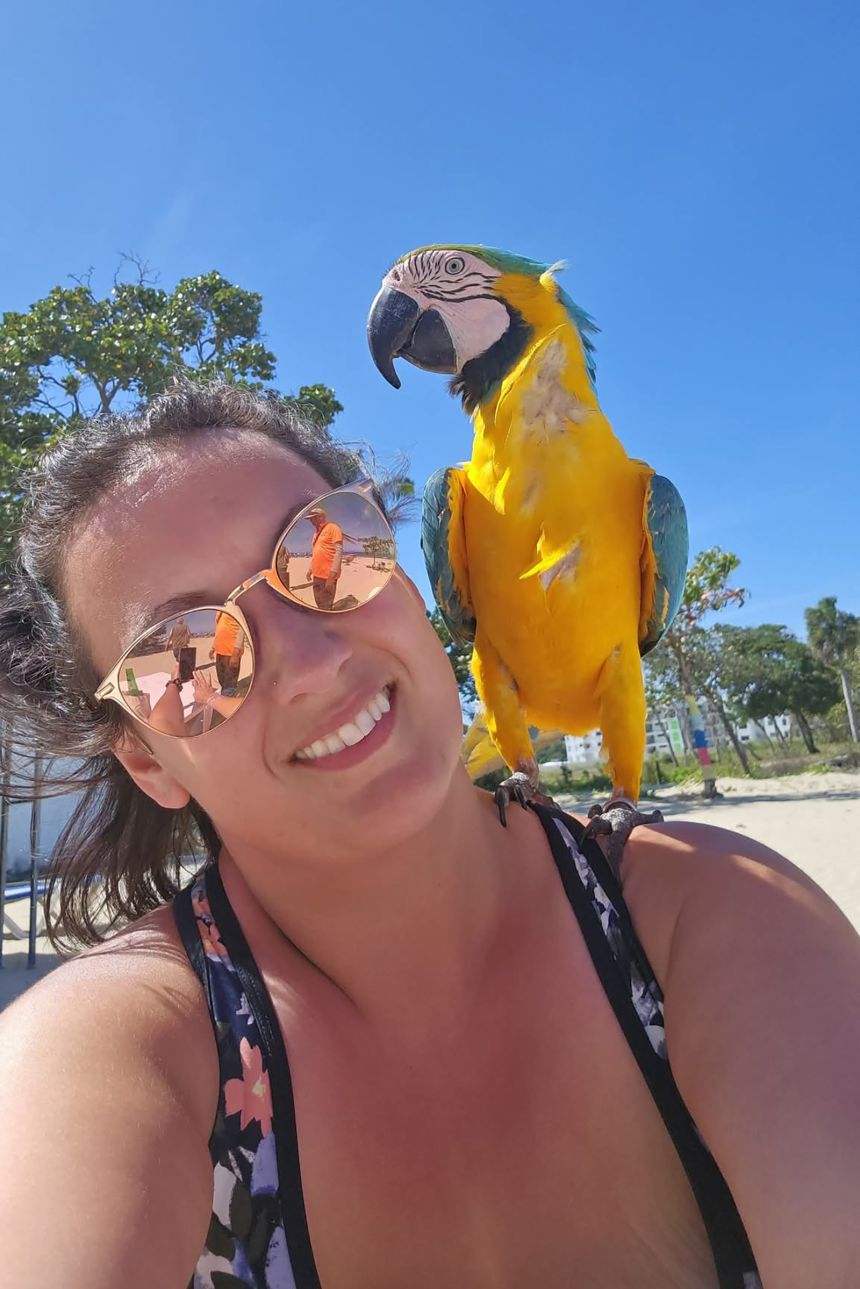

Chelsea Metzger didn’t set out to pretend she was Canadian.
It was only after a heated confrontation with Canadians and a surprising exchange with a local taxi driver during her vacation in the Dominican Republic earlier this year that the American tourist from upstate New York resorted to lying about her nationality for the first time.
Metzger, 33, and her fiancé were at a French-Canadian bar in El Pueblito in February, which was showing the final of the 4 Nations Face-Off hockey tournament between Canada and the US.
When the American team scored a goal, Metzger’s lone, “Woo, USA,” did not go down well.
“A Canadian couple screamed at me, saying that America is selfish, and ruining everything for Canada and the world,” Metzger told CNN. “The girl started crying, and said, ‘I don’t think Americans realize that what’s going on is really affecting us here.’”
Metzger tried to defend herself, explaining that she didn’t vote for Trump. But tempers flared under the influence of alcohol. Eventually, the situation de-escalated and the couple returned to apologize with a flight of shots.
“I told her I get it. As somebody who didn’t vote for this, it’s affecting everyone. We’re all feeling the effects of it and unfortunately, the only thing we can do right now is ride it out together.”
While trying to flag down a taxi during the same trip, a local driver mistook them for Canadians until she corrected him. Instead of picking them up, he offered a curt, “OK, have a good day,” and drove off.
So for a few weeks, Metzger introduced herself as Canadian.
It’s like the early 2000s all over again
The maple leaf has long been a powerful diplomatic accessory for Canadian travelers who have been known to sew the Canadian flag on their bags to distinguish themselves from Americans.
But over the last few months, some US tourists have revived a decades-old practice of masquerading as Canadians in order to avoid anti-American sentiment abroad under the Trump administration. They’re hiding behind the maple leaf, falsely identifying themselves as Canadians and displaying the Canadian flag on their bags in a phenomenon known as flag jacking.
And Canadians are irate.
“For some reason, Americans think that we are their backup passport. The world’s first dual-action moral absolver. Just apply gently and watch the shame disappear,” says Tod Maffin, a Canadian cultural commentator who eviscerates flag-jacking Americans in a short video rant that has had more than 100,000 views across his social media platforms since being uploaded less than three months ago.

Maffin’s barbed message spares no one — not even the liberal, progressive Americans who protest that they didn’t vote for Trump and are simply trying to pass themselves off as Canadian because they feel ashamed or unsafe.
“And look, we get you. A lot of you have been out in the streets, fighting for something better. Some of you are just trying to travel without getting yelled at at customs. We get it,” Maffin says.
But the Canadian flag is not a shield or an invisibility cloak, he continues. “Calling yourself Canadian is not a safety move. It’s performance art.”
The days of Canadians offering a sympathetic shoulder as an “emotional support Canadian” to their non-MAGA neighbors — an online trend that emerged following Trump’s election in 2024 — appear to be over.
Trump’s on-again, off-again tariff war, threats to annex Canada and make it a 51st state, and his obsessive belittling of former Prime Minister Justin Trudeau, have hardened Canadians against their neighbor and rekindled a form of Canadian nationalism that hasn’t been seen in decades.
“External threats are what stimulate nationalist responses,” explains Robert Schertzer, an associate professor of political science at the University of Toronto. “It’s what sociologists call collective effervescence, a spontaneous bubbling to the surface of sentiment.”
In Canada, this collective effervescence has manifested itself in the booing of the American national anthem at sporting events, the boycotting of US travel and American-made products, and the waving of the Canadian flag, messaging that doubles down on what may feel like an uncomfortable truth for both Canadians and Americans.

“Canadian nationalism at its core has an element of anti-Americanism,” Schertzer says, explaining that emotions associated with nationalism can be as powerful as those linked to religion.
“So when an American pretends to be Canadian, it’s understandable why a person who is feeling this national pride and is stimulated by outside threats would respond emotionally to that.”
Earlier this year, Trudeau also defined Canada’s national identity by what it’s not.
“Canadians are incredibly proud of being Canadian,” he told CNN’s Jake Tapper in January. “One of the ways we define ourselves most easily is, ‘Well, we’re not American.”
Which is why Canadians are particularly incensed at the notion that any American would hijack the Canadian flag and claim it as theirs. In the online discourse, outraged Canadians offer up a long list of why this practice — which some Americans are presenting as a travel hack or laughing off as a harmless joke — is offensive and arrogant.
It’s cosplaying; cultural theft and appropriation; makes a mockery of the Canadian flag; ruins Canadian goodwill and the country’s reputation around the world. It’s fraudulent; arrogant; cowardly and entitled, they say.
Some argue the practice is riding on the coattails of Canada’s historical ties to countries such as the Netherlands, which was liberated by Canadian troops during World War II and where Canadians are particularly appreciated.

And it’s ironic in light of American exceptionalism. If America is the greatest country on earth, Canadians ask online, why are Americans concealing their nationality and hiding behind another flag?
“As things continued to devolve in the US, we saw a lot of Americans talking about international travel and this idea of cosplaying a Canadian came up frequently,” Maffin told CNN from his home in Nanaimo, British Columbia.
“I tried to give voice to what a lot of Canadians have thought for generations. We are not a cape to put on to disorient people from the fact that you are from a specific nation. Canada is a country. We are not a costume shop.”
Many travelers who backpacked through Europe in the 1990s and 2000s can vouch for the phenomenon, when some young Americans posed as Canadians. The act of subterfuge was particularly common in the 2000s, amidst America’s unpopular foreign policy and the country’s invasion of Afghanistan and Iraq.
In a 2005 episode of “The Simpsons” set in Italy, Lisa Simpson sews a Canadian flag on her backpack because, “Well, some people in Europe have the impression that America has made some stupid choices in the past, oh, five years. So for the next week, I’m from Canada.”
When the clothes don’t fit

That’s what Chelsea Metzger did this year. Making up a backstory wasn’t hard for her. Over the years, she made several Canadian friends during her annual month-long trip to the Dominican Republic, including a friend from the small town of Janetville. Adopting that Ontario town seemed like a believable cover story and worked most of the time — except when a fellow American called her out after hearing her accent.
Another American from Michigan told CNN that during their travels in Greece, she and her friend lied to their waiter and told him they were Canadian after being sneered at for being American one too many times during their Euro holiday this summer.
When he asked where in Canada they were from, her friend blurted out Ontario. What they didn’t expect was that the waiter knew more about the province than they did, and started excitedly reeling off places that they knew nothing about. Their plan quickly unraveled.
“After that we kind of decided not to do it again because it was pretty awkward not being able to back that up. It was just like a silly idea,” said Grace, 22, a Republican who asked to be identified only by her first name for fear of backlash.
But for Canadians like Maffin, the practice of posing as faux Canadians is problematic because it risks sullying Canada’s global reputation.
“There are almost no places in this world where you can parachute in, say you’re from Canada and not be welcomed,” he said. “The same cannot be said for Americans. The solution is to fix your own house, not to come to ours and put our clothes on.”